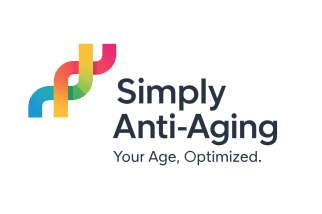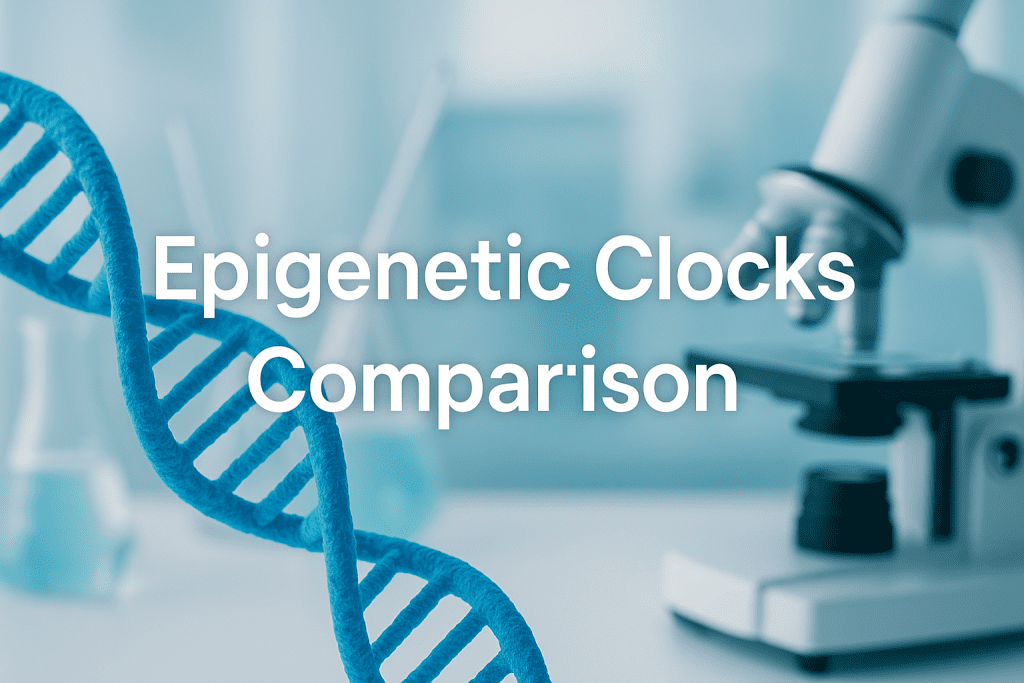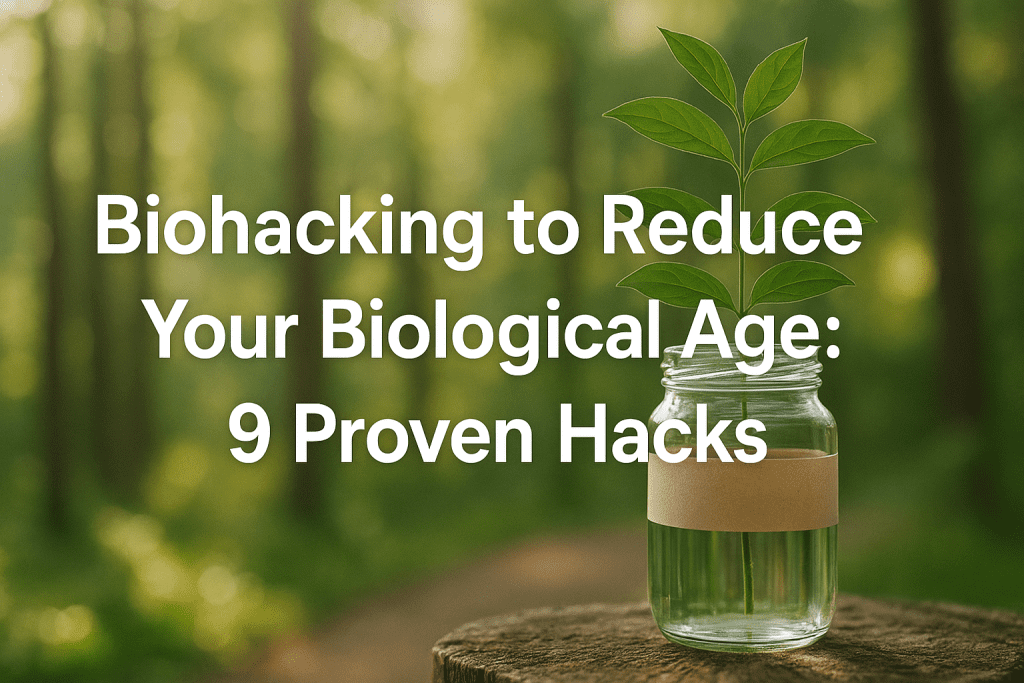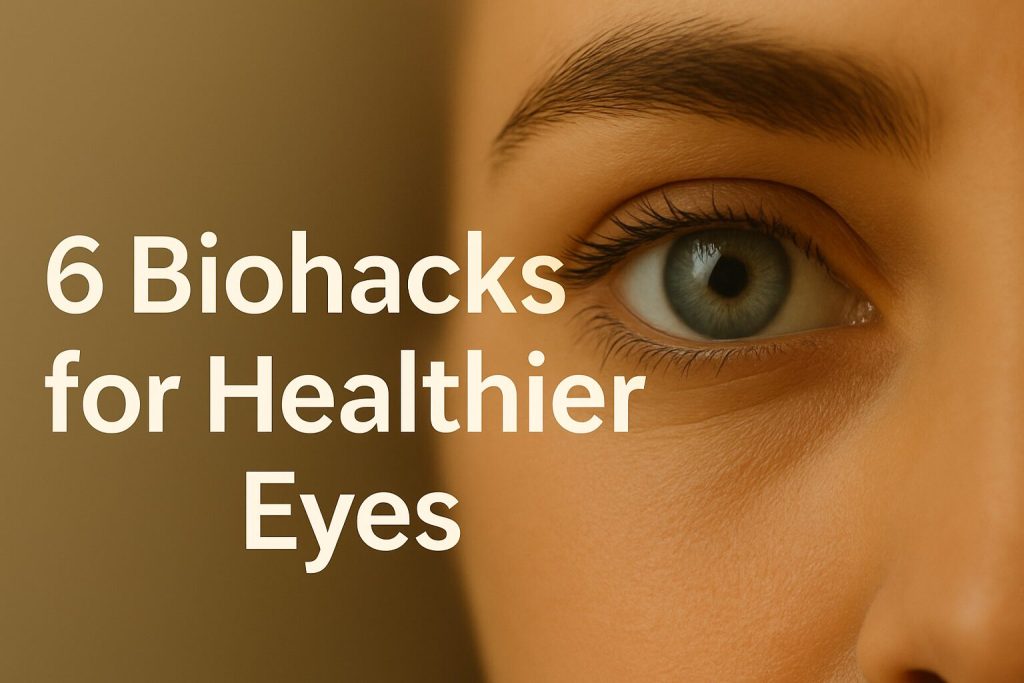
Your eyes face constant stress: artificial light, endless screen time, poor posture, and even diet choices. Over time, these factors accelerate vision decline and make your eyes feel older than they are.
The good news? Most of this is preventable. Through eyes biohacking, you can build daily habits that protect sight, reduce strain, and support long-term eye health.
Here are six evidence-based ways to biohack your eyes and keep your vision sharp.
Table of Contents
Morning light as a natural eye reset
Your visual system is linked to your circadian rhythm. The suprachiasmatic nucleus (SCN) in the brain acts as your master clock, and light entering the eyes controls how it runs.
When you get natural light within an hour of waking, you:
- Signal your body to balance melatonin and cortisol
- Improve alertness and mood
- Reduce strain caused by screen light later in the day
Without this reset, blue light from devices can delay melatonin release at night, disrupting sleep and straining your eyes.
📍 Action tip: Go outside for 5–10 minutes without sunglasses, even if it’s cloudy. Outdoor light is still far stronger than indoor bulbs.
🔗 NIH – Light and the Circadian System
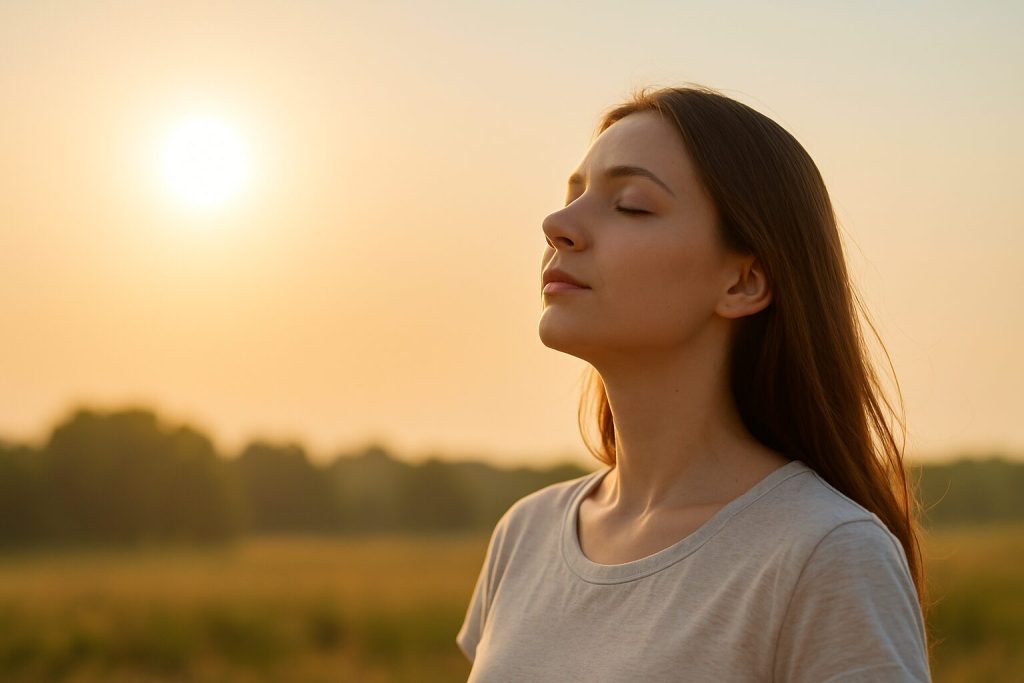
The 20-20-20 rule for screen strain
Screen use contracts the ciliary muscles that help you focus. Over time, this leads to blur, fatigue, and headaches. The 20-20-20 rule is a simple technique recommended by ophthalmologists:
- Every 20 minutes
- Look at something 20 feet away
- For at least 20 seconds
This quick reset relaxes eye muscles and prevents cumulative strain. Apps like EyeLeo can remind you automatically.
🔗 American Academy of Ophthalmology – Computer Vision Syndrome

Can nutrition really improve vision?
Yes. Nutrients like lutein and zeaxanthin are proven to support retinal health.
These antioxidants are concentrated in the macula, where they:
- Filter harmful blue light
- Lower oxidative stress
- Improve glare tolerance and visual performance
🥗 Food sources include:
- Kale, spinach, swiss chard
- Carrots, corn, egg yolks
Supplements with 10 mg lutein + 2 mg zeaxanthin daily are often studied for screen-related visual fatigue.
🔗 NIH – Carotenoids and Eye Health

Cooling biohacks for inflamed eyes
Extended screen time reduces blinking by up to 60 percent. That causes poor lubrication and inflammation, making your eyes feel swollen or hot.
Cold therapy offers quick relief by constricting blood vessels and activating the parasympathetic nervous system.
🥶 Try this:
- Keep 2 spoons in the fridge and place them on closed eyelids for 2–3 minutes
- Or use a chilled damp washcloth for the same effect
It’s simple, safe, and effective for end-of-day eye fatigue.

How do omega-3 fatty acids support eye health?
Omega-3s improve the quality of your tears, reducing dry eye symptoms.
Dry eyes are not always due to hydration. Often, they result from poor tear quality because the meibomian glands (which produce the tear’s oily layer) are underperforming.
Omega-3 fatty acids, especially EPA and DHA, strengthen this lipid layer, helping tears last longer and keeping your eyes more comfortable.
🌊 Best sources:
- Salmon, sardines, mackerel
- Flaxseed, chia, walnuts (plant-based options)
- Clean Supplements – 100% Omega 3
A randomized controlled trial in Cornea found omega-3 supplementation improved dry eye symptoms in just 12 weeks.
🔗 PubMed – Omega-3 and Dry Eye

Ergonomic fixes for digital vision
Screens aren’t just tiring for your eyes. The way you sit and look at them can cause neck pain, headaches, and even reduced blink rate.
Simple adjustments protect your eyes and posture:
- Keep laptops and phones at eye level
- Stay at least 40 cm (16 inches) away
- Blink more often when reading long texts
These tweaks are small, but over time, they prevent chronic strain.
Is vision decline really part of normal aging?
Not entirely. Lifestyle plays a huge role.
Yes, some age-related eye changes are inevitable. But studies show a large portion of vision problems are linked to modifiable factors:
- Poor diet
- Excessive screen time
- Lack of outdoor light exposure
- Smoking and high inflammation
This means that eyes biohacking is preventive medicine. By acting early, you can reduce risk for cataracts, macular degeneration, and chronic eye strain.
The link between vision health and brain aging
Vision is not an isolated system. Poor eyesight is strongly associated with faster biological aging and higher risks of dementia.
A large NIH-backed study in 2021 found that adults with untreated vision loss had higher rates of cognitive decline. Scientists believe vision problems may reduce brain stimulation and increase social isolation, both of which accelerate aging.
That makes eyes biohacking more than a comfort practice. It is a longevity strategy.
🔗 NIH – Vision Impairment and Cognitive Decline
FAQs about eyes biohacking
What is eyes biohacking?
It’s the use of science-based strategies such as nutrition, light exposure, screen habits, and recovery methods to support and protect vision health.
Can blue light damage vision long-term?
Yes. Excessive exposure contributes to oxidative stress in the retina, especially the macula. Antioxidants like lutein and zeaxanthin help filter it.
Does omega-3 supplementation actually help dry eyes?
Clinical studies confirm that omega-3s (EPA and DHA) improve tear stability and reduce discomfort within weeks.
How effective is the 20-20-20 rule?
It’s proven to reduce digital eye strain, especially when combined with posture adjustments and scheduled breaks.
Which foods are best for eye health?
Leafy greens, carrots, corn, egg yolks, and oily fish all provide antioxidants and fatty acids linked to healthier vision.
How does vision health affect aging?
Vision decline is associated with faster biological aging and higher dementia risk. Protecting your eyes also protects your brain.
Is cooling therapy safe for the eyes?
Yes. Cold compresses reduce inflammation and puffiness safely when used for short periods.
Do eye biohacks replace regular exams?
No. These are preventive tools. Annual eye exams remain essential for detecting glaucoma, cataracts, or macular degeneration.
Don’t wait for symptoms
Your eyes are not just windows to the world.
They are an early warning system for your health. Ignoring fatigue, dryness, or blurry vision accelerates decline.
But with these six eyes biohacking strategies you give your eyes the daily care they need.
Small steps now protect your vision for decades to come.
